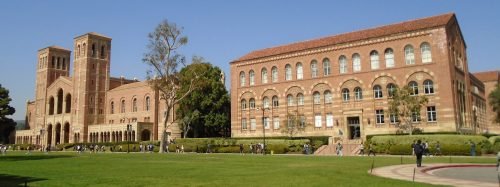

By Akshaj Mehta
LOS ANGELES- The UCLA Cluster Program is a academic transition program curated specifically for first year students. Cluster programs are a year-long course, and allow for students to satisfy four of their GE requirements, as opposed to three — the maximum otherwise possible in three classes.
The Clusters for the 23-24 school year cover a wide range of topics, such as the “Evolution of Cosmos,” “Data, Justice and Society,” “Political Violence, America and the Sixties,” and more.
“During my new student orientation, my NSA was a strong advocate for the clusters, especially Cluster 70: Evolution of Life and Cosmos. As a non stem major, all of my science class requirements would be filled and I would have the liberty to choose classes that interested me rather than trying to fulfill certain criteria,” said Jennifer Chan, political science major at UCLA who enrolled in the Evolution of Cosmos Cluster.
Nathan Lee took the same cluster for similar reasons.
“I took a cluster class because I thought it would be a good chance to fulfill a lot of credits, and I knew it was only offered to freshmen so I wanted to capitalize on the opportunity. I also heard from my NSA about the cluster I’m currently in, and some of my older friends at UCLA recommended that I take it,” said Lee.
Socially, Ray Gonzalez and Jennifer Chan find that it’s easier to build friendships than in other classes, knowing that students would be in this class year long.
“I think they are great options for students, especially as freshmen, because they provide a sense of continuity if you stick with it the whole year,” said Ray Gonzalez, student in the Evolution of Cosmos Cluster.
“In regards to the social aspect, clusters are year long classes that result in friendships for a much longer period in comparison to classes that only last a quarter. Clusters are exclusively reserved for 1st years and are filled with individuals of a wide array of majors which allows students to meet students that would not normally be in their other classes,” said Chan.
“I think that the cluster is a good option for students because it’s a chance to meet and familiarize yourself with the same people for the entire school year and it also guarantees that I will have a class during 2nd pass enrollment,” said Lee.
However, as explained by Lee, sticking in a cluster class throughout the entire year harms the flexibility of your year-long class schedule.
“I didn’t realize before I enrolled in my cluster, but it kind of harms the flexibility of my class schedule because, during winter and spring enrollment, I’m not able to take some classes that I want for my major because the lecture times conflict with the cluster I’m currently enrolled in,” said Lee.
Upon completion, students in any cluster course also receive the Writing II.
“I liked the fact that you could earn the writing 2 credit and the fact that they offer field trips to cool places during each quarter,” said Ray Gonzalez.
In the Evolution of Cosmos Cluster specifically, students were able to take the opportunity to go and visit the Mount Wilson Observatory.
The benefits that students receive most definitely outweigh the difficult assignments and heavy workload associated with cluster courses.
“My cluster has been difficult but I’m grateful to be in it because I don’t consider myself a student who enjoys STEM, but my TA and professors do their best to broaden my appreciation of academic fields outside of the humanities,” said Lee.
“So far I am enjoying my cluster quite a bit. It is definitely one of my more work heavy classes, but nothing that is not manageable. Overall, I would recommend the option of clusters to incoming first years and, if given the opportunity, I would continue my decision to take a cluster,” said Chan.
Personally, my experiences with the Evolution of Cosmos Cluster has been the same. The workload is plenty, and the assignments are definitely more challenging to students in non-STEM majors.
However, the benefit of completing all science GE’s needed for graduation requirements are a massive reason I took this class, especially because it all can be done in a single year.





Back in the seventies I was in an alternative general education program at Humboldt State. It was called Cluster College. It was a great educational experience.
Its ironic that one of the options “Data, Justice and Society” is listed in the article beneath a photo of the plaza in front of Royce Hall. As a neighborhood kid in West L.A. I have this vivid memory of the LAPD chasing protesters with billy clubs off the plaza during the student strike of spring 1970. Nixon had secretly expanded the Vietnam War into Cambodia, there was still a military draft, campuses all over America were shut down in protest, the national guard was called out and James Rector was killed in Berkeley by them while four others were shot at Kent State. Governor Ronald Reagan defiantly said “If it takes a bloodbath then let’s get it over with.”
I never forgave him for that.
This is one of the most beautiful pieces i’ve read from UCLA. The authors ability to capture such a boring mediocre topic in an interesting way is truly inspiring. I salute you!